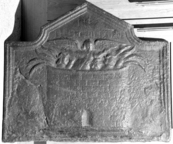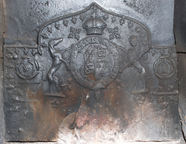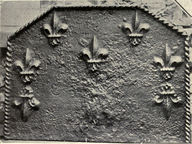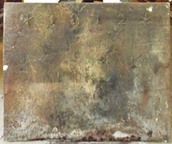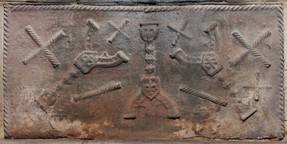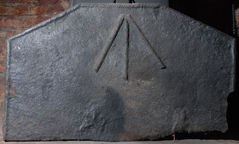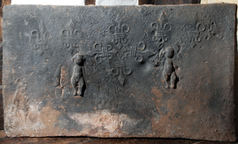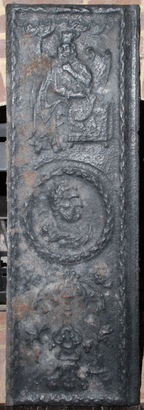-
159
Description: Rectangular with ‘pediment’ arch linked by cavetto curves; fillet and cavetto edging; pictorial, a cylindrical furnace with inscribed stone courses, flames issuing from the top, with the heads of three people, a hand raised from two of them, and an angel with wings and arms outstretched; the furnace has a small arched opening bottom centre; above the angel, the inscription was inscribed on the pattern.
Notes: The scene represents Shadrach, Meshach, and Abednego being delivered from the burning fiery furnace by the angel of God (Daniel 3), the phrase, The Three Children, being a reference to the eponymous apocryphal verses from the Book of Daniel. Formerly at Brightling Hall, Robertsbridge, Sussex.
Inscription: THE THREE CHILDREN
- Decoration tags:
- rectangular with pediment (shape)
- cavetto (edging)
- whole carved pattern
- pictorial
- biblical
- architectural
- text
- humans
- objects
Manufactured: in the early- to mid-17th century possibly in the Weald area of England.
Current location: Hastings Museum and Art Gallery, John's Place, Bohemia Road, Hastings, East Sussex, England.
Museum number: HASMG: 1913.58 (part of the Hastings Museum museum group)
Citation: Baines, J. M., 1958, Wealden Firebacks (Hastings Museum).
Citation: Butterfield, W. R., 1916, 'Old Wealden Firebacks', The Connoisseur, 46, pp. 197-209.
Citation: Butterfield, W. R., 23 Feb 1935, 'A Scriptural Fireback', Hastings and St Leonards Observer.
- Attached to series:
- Old Testament & Apocrypha firebacks
-
188
Description: Cavetto-canted rectangle with arch; ovolo-moulded edging; shield, garter, helm, mantling, crest and supporters of William Cecil, 1st Lord Burghley, KG (1520-98). Date below garter.
Notes: William Cecil was Queen Elizabeth I's first minister. The wooden pattern for this fireback (no. 926), itself a fine carved, wooden painted panel, is at Hatfield House, Hertfordshire.
Copies of this fireback are known.
Inscription: HONI SOIT QUI MAL Y PENSE 15 75
Arms: William Cecil, KG, 1st Baron Burghley
- Decoration tags:
- rectangular with canted top corners and round arch (shape)
- ovolo (edging)
- whole carved pattern
- planklines
- armorial
- text
Manufactured: in 1575 possibly in the Weald area of England.
Current location: Hatfield House, Hatfield, Hertfordshire, England.
- Attached to series:
- Personal armorial firebacks
- Armorial panel firebacks
-
189
Description: Rectangular with an ogee arch; twisted rope edging (top and sides); line of small fleurs-de-lys around the top and sides, inside the edging; Tudor rose inside each top corner (overstamped on the left); below each rose an escarbuncle of twisted rope with fleur de lys terminals (understamped); top centre, a Tudor royal shield within an oval garter - HONE SOVT QUEY MAL Y PENSE - with greyhound and lion supporters, and crown above; cross of small fleurs inclined to each side of the crown; inverted 'Y' shape in twisted rope below each supporter, a fleur at the top end of each.
Notes: An oft-used achievement of arms; twisted rope with fleur de lys terminals are seen on other firebacks from the same source; it is a form paralleled on firebacks from the Champagne area of France. The escarbuncle was the principal charge on the arms of the Duchy of Cleves, the same charge on this fireback possibly associating it with the brief marriage of Henry VIII and Anne of Cleves.
Inscription: HONE SOVT QUEY MAL Y PENSE
Arms: Tudor royal (prob. Elizabeth I)
- Decoration tags:
- rectangular with ogee-arch (shape)
- rope (edging)
- carved stamps
- heraldic
- armorial
- royal
- text
- objects
Manufactured: in the mid- to late-16th century possibly at Pounsley Furnace, Framfield in the Weald area of England.
Current location: in private hands, Hatfield, Hertfordshire, England.
-
318
Description: Canted rectangle; twisted rope edging (top and sides); symmetrical arrangement of a fleur-d-lys stamp repeated seven times (2-3-2), with the middle one of the three slight above the other two, and the bottom two inverted immediately below the outer two of the three.
Notes: The style of the fleurs is identical to those on two firebacks decorated with firedogs bearing the initials, HN, and the crossed staple badge of the Nevills; Henry Nevill occupied Mayfield furnace from about 1585 until 1599.
- Decoration tags:
- rectangular with canted top corners (shape)
- rope (edging)
- carved stamps
- heraldic
Manufactured: in the late-16th century possibly at Mayfield Furnace in the Weald area of England.
Current location: not known.
Citation: Hayden, A., 1912, Chats on Cottage and Farmhouse Furniture (Unwin, London).
- Attached to series:
- Henry Nevill series
-
1127
Description: Plain rectangle; no edging; top centre, date between two six-pointed stars.
Notes: Characteristic of the last firebacks cast at Ashburnham Furnace, Sussex. One of a small series of firebacks cast in the early-19th century for farms on the Ashburnham estate.
Inscription: * 1812 *
- Decoration tags:
- rectangular (shape)
- none (edging)
- carved stamps
- individual numbers
- text
- objects
Manufactured: in 1812 at Ashburnham Furnace in the Weald area of England.
Current location: not known.
- Attached to series:
- Date only firebacks
- Ashburnham late series
-
912
Description: Rectangular; twisted rope edging (top and sides); impression of the end of a firedog repeated three times, one upright in centre, two diagonally inverted with feet angled towards top centre; a large saltire of twisted rope in each top corner, a small saltire, of twisted rope and dowel, on either side of top of central firedog; cross of twisted rope below right hand corner saltire; lower centre, two angled rope lengths either side of central firedog. At the bottom, and outside the feet of the central firedog, two excrescences formed by the pouring of the metal.
Notes: A well-preserved example with an unusual arrangement of the firedog stamp; formerly (c.1886) in the Warbill-in-Tun inn, Warbleton, Sussex.
- Decoration tags:
- rectangular (shape)
- rope (edging)
- simple stamps
- apotropaic
- objects
Manufactured: in the mid- to late-16th century in the Weald area of England.
Current location: in private hands, Heathfield, East Sussex, England.
Citation: Balcomb, J. T., Nov. 1886, 'An Extinct Sussex Art', The Art Journal, pp. 337-340.
- Attached to series:
- Firedog stamp firebacks
- Metalware stamp firebacks
-
921
Description: Canted rectangle; twisted rope edging (top and sides); central arrow-shaped design formed of three repeated rope lengths.
Notes: The arrow design probably has an apotropaic (evil-averting) purpose, perhaps intended as the initials VV for 'virgo virginum'.
- Decoration tags:
- rectangular with canted top corners (shape)
- rope (edging)
- simple stamps
- apotropaic
- objects
Manufactured: in the 16th century in the Weald area of England.
Current location: in private hands, Heathfield, East Sussex, England.
- Attached to series:
- Rope design firebacks
-
922
Description: Rectangular; no edging; arrangement of eight fleur de lys stamps formed of, at top centre, four in a cross shape, with two in line on each side; on each side of the cross arrangement is a naked standing putto stamp.
Notes: The putti are an unusual addition to what is a quite crudely decorated fireback
- Decoration tags:
- rectangular (shape)
- none (edging)
- carved stamps
- heraldic
- humans
Manufactured: in the late-16th century in the Weald area of England.
Current location: in private hands, Heathfield, East Sussex, England.
- Attached to series:
- Figurine firebacks
-
923
Description: Rectangular; overlapping laurel leaf edging with flange on right edge; top, seated figure of a monarch with a casket at his left side and the back of a throne behind; centre, bust of a classical male figure facing to the right, surrounded by a circlet of overlapping laurel leaves; bottom, ornamental pedestal on a legged stand, floral fronds issuing from the top, between two flower heads, and descending symmetrically to the bottom.
Notes: Not a fireback, but a left side fireplace back plate. It had a circular aperture in the centre into which, in this instance, a medallion and bust were inserted, the same being inserted into an elaborate baroque fireback (no. 452).
- Decoration tags:
- rectangular (shape)
- overlapping laurel leaf (edging)
- carved stamps
- carved pattern panels
- biblical
- humans
- plants
Manufactured: in the early- to mid-18th century probably at Robertsbridge Furnace, Salehurst in the Weald area of England.
Current location: in private hands, Heathfield, East Sussex, England.
- Attached to series:
- Baroque series
- Fireplace back plates
-
191
Description: Arched rectangle; cavetto moulded edging; Tudor royal shield, Garter and crown, with crowned lion and dragon supporters; motto along bottom; Tudor rose to left of crown, portcullis to right.
Notes: This painted fireback is reputed to have been a gift from King Henry VIII to the second Sir William Godolphin, who was present at the Siege of Boulogne in 1544 with a party of Godolphin tin miners. Copies of this style of fireback were advertised in Kings Worthy Foundry's (Winchester) catalogue in the mid-20th century.
Copies of this fireback are known.
Inscription: HONI SOIT QVI MAL E PENSE / DIEU ET MON DROIT
Arms: Tudor royal (Elizabeth I)
- Decoration tags:
- rectangular with round arch (shape)
- cavetto (edging)
- whole carved pattern
- armorial
- text
Manufactured: in the mid- to late-16th century possibly in the Weald area of England.
Current location: Godolphin House, Helston, Cornwall, England.
Museum number: 169480 (part of the National Trust museum group)
- Attached to series:
- Tudor royal armorial firebacks
